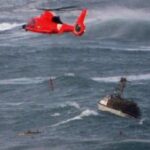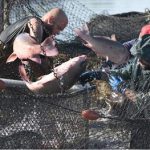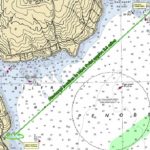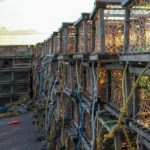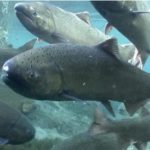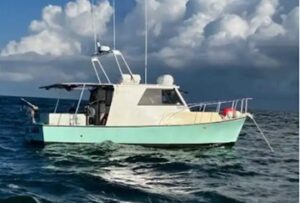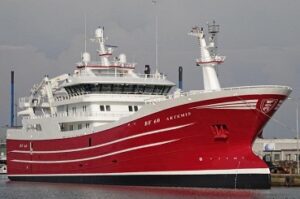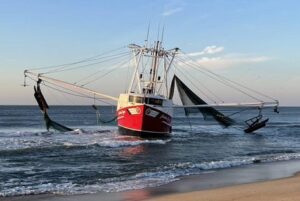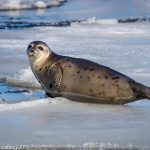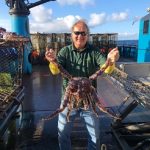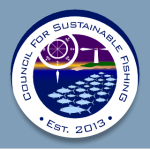Daily Archives: August 12, 2016
Illuminating Fishing Nets Prevent Bycatch
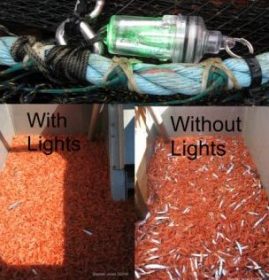 Bycatch is an economic and environmental problem for commercial fishing. Large trawlers often scoop up sea-life other than the species they’re targeting, and if there’s too much bycatch fishermen sometimes have to dump their catch. But Bob Hannah of the Oregon Department of Fish and Wildlife may have found a simple, affordable solution. He tells Living on Earth’s Emmett FitzGerald how local shrimp fishermen are eliminating bycatch of an important smelt species by lighting up their nets with LEDs. The waters off the coast of Oregon teem with delectable pink shrimp. But shrimpers often also scoop up fish they don’t want, what’s known as “by-catch”, in particular a smelt called the eulachon. And that is costly – for the eulachon, and the fishing boat operators. But Government scientists have discovered a nifty way to cut the eulachon by-catch using LED lights. Bob Hannah of the Oregon Department of Fish and Wildlife told Living on Earth’s Emmett FitzGerald all about it. Read the story here 19:59
Bycatch is an economic and environmental problem for commercial fishing. Large trawlers often scoop up sea-life other than the species they’re targeting, and if there’s too much bycatch fishermen sometimes have to dump their catch. But Bob Hannah of the Oregon Department of Fish and Wildlife may have found a simple, affordable solution. He tells Living on Earth’s Emmett FitzGerald how local shrimp fishermen are eliminating bycatch of an important smelt species by lighting up their nets with LEDs. The waters off the coast of Oregon teem with delectable pink shrimp. But shrimpers often also scoop up fish they don’t want, what’s known as “by-catch”, in particular a smelt called the eulachon. And that is costly – for the eulachon, and the fishing boat operators. But Government scientists have discovered a nifty way to cut the eulachon by-catch using LED lights. Bob Hannah of the Oregon Department of Fish and Wildlife told Living on Earth’s Emmett FitzGerald all about it. Read the story here 19:59
Clam chowder calamity as fishing crew pulls up unexploded ordnance
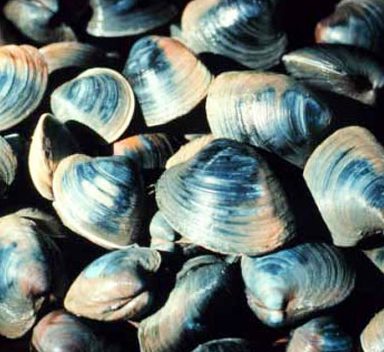 A fishing crew apparently pulled up unexploded ordnance while clamming, leading to a fisherman being hospitalized with second-degree burns and the destruction of more than 700 cases of chowder, officials said. It’s unclear what the ordnance was, but fishing vessels along the Atlantic Coast routinely dredge up munitions, including mustard agent, that was dumped at sea decades ago when environmental laws were far more lax. The injured fisherman was treated at a hospital in Philadelphia for burns and blisters, said U.S. Coast Guard Petty Officer Seth Johnson. Such injuries are consistent with mustard agent exposure. The crew of the fishing vessel the William Lee found what they believed was an old or discarded ordnance canister on Aug. 2 and threw it back into the ocean 30 miles east of Barnegat Inlet, Johnson said. Larry Hajna, a spokesman for the state Department of Environmental Protection, said the agency wasn’t told about it until Tuesday — a week later. The agency immediately reported it to the Coast Guard, he said. The boat was impounded in Atlantic City and inspected Wednesday, but no hazardous materials were found, Johnson said. In the meantime, clams from the vessel had already been delivered to Sea Watch International, a seafood processor in Milford, Delaware. More than 500 cases of clam chowder were impounded,, Read the rest here 15:38
A fishing crew apparently pulled up unexploded ordnance while clamming, leading to a fisherman being hospitalized with second-degree burns and the destruction of more than 700 cases of chowder, officials said. It’s unclear what the ordnance was, but fishing vessels along the Atlantic Coast routinely dredge up munitions, including mustard agent, that was dumped at sea decades ago when environmental laws were far more lax. The injured fisherman was treated at a hospital in Philadelphia for burns and blisters, said U.S. Coast Guard Petty Officer Seth Johnson. Such injuries are consistent with mustard agent exposure. The crew of the fishing vessel the William Lee found what they believed was an old or discarded ordnance canister on Aug. 2 and threw it back into the ocean 30 miles east of Barnegat Inlet, Johnson said. Larry Hajna, a spokesman for the state Department of Environmental Protection, said the agency wasn’t told about it until Tuesday — a week later. The agency immediately reported it to the Coast Guard, he said. The boat was impounded in Atlantic City and inspected Wednesday, but no hazardous materials were found, Johnson said. In the meantime, clams from the vessel had already been delivered to Sea Watch International, a seafood processor in Milford, Delaware. More than 500 cases of clam chowder were impounded,, Read the rest here 15:38
Pacific Seafoods faces new lawsuit alleging anti-competitive behavior
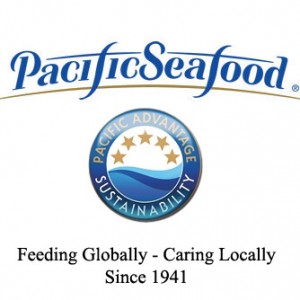 Oregon-based Seawater Seafoods has sued its larger rival Pacific Seafoods in federal court bringing allegations of anticompetitive behavior and claims that Pacific is blocking Seawater’s waterfront access. Seawater is a Dungeness crab processor that recently expanded into squid and albacore and intends to add coldwater shrimp and trawl-caught groundfish to its business. The Newport, Oregon-based firm is bordered on both sides by Pacific and accuses the company of several behaviors it describes as anti-competitive. “Throughout the 2014-15 crab season defendants relentlessly harassed plaintiffs, intimidated Seawater’s suppliers, obstructed its access to public waterways, allowed its property to be damaged by wild animals and noxious chemicals, and generally acted in a manner calculated to snuff out plaintiffs’ competing business,” the complaint states. Read the rest here 14:36
Oregon-based Seawater Seafoods has sued its larger rival Pacific Seafoods in federal court bringing allegations of anticompetitive behavior and claims that Pacific is blocking Seawater’s waterfront access. Seawater is a Dungeness crab processor that recently expanded into squid and albacore and intends to add coldwater shrimp and trawl-caught groundfish to its business. The Newport, Oregon-based firm is bordered on both sides by Pacific and accuses the company of several behaviors it describes as anti-competitive. “Throughout the 2014-15 crab season defendants relentlessly harassed plaintiffs, intimidated Seawater’s suppliers, obstructed its access to public waterways, allowed its property to be damaged by wild animals and noxious chemicals, and generally acted in a manner calculated to snuff out plaintiffs’ competing business,” the complaint states. Read the rest here 14:36
A total shutdown of all salmon fisheries on the Fraser River to conserve sockeye
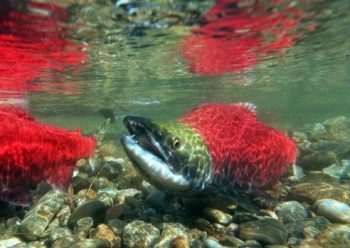 The Fraser River was shut down Thursday at sundown to all salmon fishing due to conservation concerns about sockeye. The notice of “immediate closure” of all salmon fisheries went out from DFO for the tidal and non-tidal sections of the Fraser. “Current run size estimates of Fraser River Summer Run sockeye salmon have resulted in no allowable harvest and a conservation concern,” according to the abrupt notice from Fisheries and Oceans Canada. The Summer run of Fraser sockeye is usually the strongest. Not this year. “The Department’s first priority is to ensure that there is sufficient sockeye returning to the spawning grounds. The Department will manage all fisheries to minimize sockeye impacts and provide priority access to First Nations’ fishing for food, social and ceremonial purposes.” Recreational anglers had been targeting chinook selectively but the risk was considered is too great for accidentally intercepting sockeye. DFO even mentioned it in their notice. Read the rest here 14:23
The Fraser River was shut down Thursday at sundown to all salmon fishing due to conservation concerns about sockeye. The notice of “immediate closure” of all salmon fisheries went out from DFO for the tidal and non-tidal sections of the Fraser. “Current run size estimates of Fraser River Summer Run sockeye salmon have resulted in no allowable harvest and a conservation concern,” according to the abrupt notice from Fisheries and Oceans Canada. The Summer run of Fraser sockeye is usually the strongest. Not this year. “The Department’s first priority is to ensure that there is sufficient sockeye returning to the spawning grounds. The Department will manage all fisheries to minimize sockeye impacts and provide priority access to First Nations’ fishing for food, social and ceremonial purposes.” Recreational anglers had been targeting chinook selectively but the risk was considered is too great for accidentally intercepting sockeye. DFO even mentioned it in their notice. Read the rest here 14:23
Greenland shark named longest-living vertebrate living up to 400 yrs
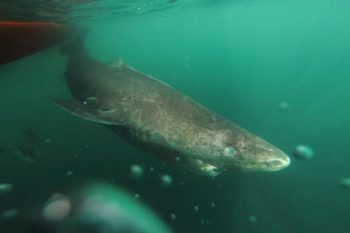 A student job with the Greenland Institute of Natural Resources inspired Julius Nielsen, lead author of the new study, to research the Greenland shark, which roams the chill waters of the North Atlantic. “I encountered the sharks here for the first time, and I was fascinated that so little were known about such large sharks,” Nielsen said. They are the largest fish native to Arctic seas, with adults typically measuring between 13 and 16 feet and females consistently outgrowing the males. Still, their biology was mostly a mystery, explained Nielsen. “For example, their age was unknown but expected to be great,” he said, based on studies from more than 50 years ago. The extremely slow growth rates of these sharks — less than a centimeter per year — suggested they must live for many years.” So how do you discover the age of a mute primordial shark? Nielsen and his colleagues turned to radiocarbon dating. Read the rest here 13:53
A student job with the Greenland Institute of Natural Resources inspired Julius Nielsen, lead author of the new study, to research the Greenland shark, which roams the chill waters of the North Atlantic. “I encountered the sharks here for the first time, and I was fascinated that so little were known about such large sharks,” Nielsen said. They are the largest fish native to Arctic seas, with adults typically measuring between 13 and 16 feet and females consistently outgrowing the males. Still, their biology was mostly a mystery, explained Nielsen. “For example, their age was unknown but expected to be great,” he said, based on studies from more than 50 years ago. The extremely slow growth rates of these sharks — less than a centimeter per year — suggested they must live for many years.” So how do you discover the age of a mute primordial shark? Nielsen and his colleagues turned to radiocarbon dating. Read the rest here 13:53
Over 250 Fishermen Rescued From Bay Of Bengal
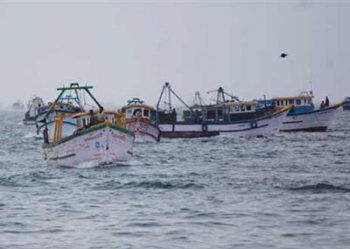 Kolkata: In one of the biggest search and rescue operations in the Bay of Bengal, over 250 fishermen in 18 fishing trawlers which had gone missing in the sea during rough weather have been rescued by the Coast Guard, officials said today. The Coast Guard has been doing a search and rescue operation to locate the missing fishing boats in the Bay of Bengal for the last 48 hours. “We have ensured safe return of 18 boats with about 254 fishermen to harbour,” officials said. Apart from diverting its ships patrolling at sea, additional surface and air assets have been pressed into service to augment the search. The operation is on for the last 48 hours and will continue till reports are received that all fishermen are safe, the officials said. Read the rest here 11:25
Kolkata: In one of the biggest search and rescue operations in the Bay of Bengal, over 250 fishermen in 18 fishing trawlers which had gone missing in the sea during rough weather have been rescued by the Coast Guard, officials said today. The Coast Guard has been doing a search and rescue operation to locate the missing fishing boats in the Bay of Bengal for the last 48 hours. “We have ensured safe return of 18 boats with about 254 fishermen to harbour,” officials said. Apart from diverting its ships patrolling at sea, additional surface and air assets have been pressed into service to augment the search. The operation is on for the last 48 hours and will continue till reports are received that all fishermen are safe, the officials said. Read the rest here 11:25
New Rules Ban Seafood Imports That Don’t Meet Strict U.S. Standards for Marine Mammal Protection
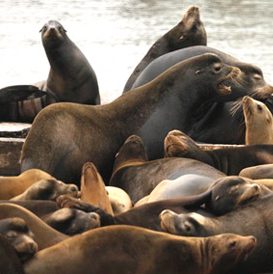 The National Marine Fisheries Service issued regulations Thursday prohibiting seafood imports from nations whose fisheries kill more whales and dolphins than U.S. standards allow. Each year around 650,000 whales, dolphins and other marine mammals are unintentionally caught and killed in fishing gear worldwide. Under the new rule, foreign fishermen must meet the same marine mammal protection standards applied to U.S. fishermen or their fish will be banned from the lucrative American seafood market. The rule is the result of a settlement in a lawsuit brought by conservation groups two years ago. The new rules will be put in place gradually with full implementation by 2022. Exporting nations will now need to track and monitor fisheries and whale, dolphin and other marine mammal populations, modify fishing gear, and may even have to close fishing in some areas to limit entanglement risk. Read the rest here 10:51 Today, NMFS published a final rule implementing import provisions of the.
The National Marine Fisheries Service issued regulations Thursday prohibiting seafood imports from nations whose fisheries kill more whales and dolphins than U.S. standards allow. Each year around 650,000 whales, dolphins and other marine mammals are unintentionally caught and killed in fishing gear worldwide. Under the new rule, foreign fishermen must meet the same marine mammal protection standards applied to U.S. fishermen or their fish will be banned from the lucrative American seafood market. The rule is the result of a settlement in a lawsuit brought by conservation groups two years ago. The new rules will be put in place gradually with full implementation by 2022. Exporting nations will now need to track and monitor fisheries and whale, dolphin and other marine mammal populations, modify fishing gear, and may even have to close fishing in some areas to limit entanglement risk. Read the rest here 10:51 Today, NMFS published a final rule implementing import provisions of the.
Environmental group distraught as tuna conservation body succumbs to politics
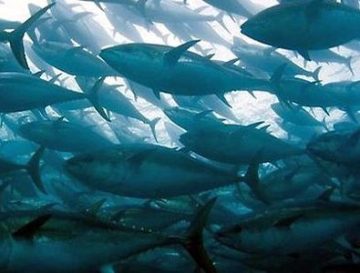 The international scientific research and public policy advocacy group, Pew Charitable Trusts, is again calling for a two-year moratorium on the commercial fishing of Pacific bluefin tuna. It comes after the group in charge of looking after tuna conservation failed to recommend action, despite stocks dropping to crisis levels. Angry environment groups say some of the 40 nations that make up the Western and Central Pacific Fisheries Commission are putting politics above scientific advice. And after 10 days of talks in Bali, Pew’s Director for Global Tuna Conservation Amanda Nickson says the commission’s scientific committee has done nothing. Listen to the audio here 10:22
The international scientific research and public policy advocacy group, Pew Charitable Trusts, is again calling for a two-year moratorium on the commercial fishing of Pacific bluefin tuna. It comes after the group in charge of looking after tuna conservation failed to recommend action, despite stocks dropping to crisis levels. Angry environment groups say some of the 40 nations that make up the Western and Central Pacific Fisheries Commission are putting politics above scientific advice. And after 10 days of talks in Bali, Pew’s Director for Global Tuna Conservation Amanda Nickson says the commission’s scientific committee has done nothing. Listen to the audio here 10:22
PETA is Hooked on Killing the Fishing Industry
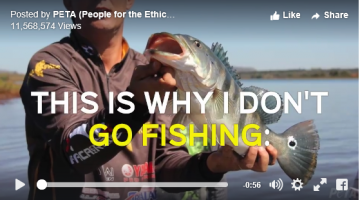 The organization People for the Ethical Treatment of Animals (PETA) recently posted a laughable video calling for an end to fishing. In the video entitled “Fish Feel Pain,” PETA suggests fishing is bad for the environment, encourages kids to terrorize animals, and harms health. Good lord! Much to the chagrin of PETA, the fishing industry–whether commercial or recreational–promotes a culture of true sustainability, family fun, and economic productivity. Fishing promotes conservation Contrary to PETA’s claims, fishing actually does promote conservation. The methods employed by anglers are deeply rooted in conservation because we want to enjoy fish for years to come. If we resort to overfishing, then the industry would tank and the environment would suffer as a result. Anglers like and encourage clean waterways, ethical methods, and safety at all times–with minimal government interference, of course. It’s our job to be good stewards of the environment–unlike those annoying radical environmentalists who lead hypocritical lives. Watch the video, and read the rest here 09:50
The organization People for the Ethical Treatment of Animals (PETA) recently posted a laughable video calling for an end to fishing. In the video entitled “Fish Feel Pain,” PETA suggests fishing is bad for the environment, encourages kids to terrorize animals, and harms health. Good lord! Much to the chagrin of PETA, the fishing industry–whether commercial or recreational–promotes a culture of true sustainability, family fun, and economic productivity. Fishing promotes conservation Contrary to PETA’s claims, fishing actually does promote conservation. The methods employed by anglers are deeply rooted in conservation because we want to enjoy fish for years to come. If we resort to overfishing, then the industry would tank and the environment would suffer as a result. Anglers like and encourage clean waterways, ethical methods, and safety at all times–with minimal government interference, of course. It’s our job to be good stewards of the environment–unlike those annoying radical environmentalists who lead hypocritical lives. Watch the video, and read the rest here 09:50

































